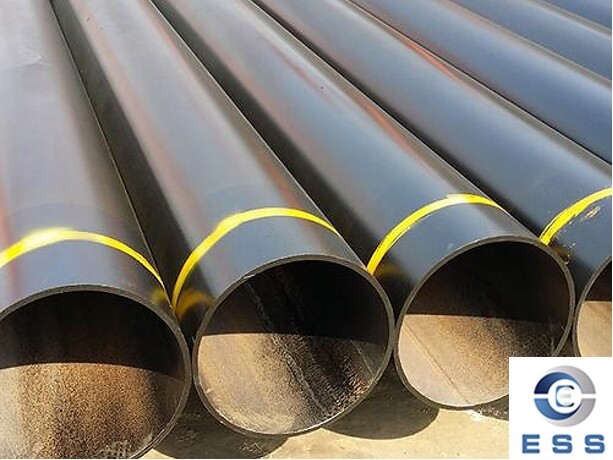
OCTG pipe is a
special pipe used for oil and gas exploration and production. It mainly
includes: drill
pipe, casing
pipe, and tubing. In addition, OCTG pipe also includes some special joints, pup joints and other auxiliary pipe fittings. These pipe fittings are used in conjunction
with drill pipes to form a complete oil drilling and production pipe string
system.
There are many grades of OCTG pipes. The
common API 5CT standard grades are as follows:
1. API H40
It is a general-purpose pipe with relatively low strength. It is suitable for shallow wells and other environments with low requirements. The minimum yield strength is 40,000psi and the minimum tensile strength is 60,000psi.
2. API J55
It is a general-purpose pipe with good tensile strength and low cost. It is suitable for most oil and gas wells. The minimum yield strength is 55,000psi and the minimum tensile strength is 75,000psi.
3. API K55
Similar to J55, but with slightly better mechanical properties and heat treatment, it is often used in shallow wells with slightly higher strength requirements, with a minimum yield strength of 55,000psi and a minimum tensile strength of 95,000psi.
4. API N80
Includes N80 Type 1 and N80Q. N80 Type 1 is lower in cost, and N80Q is a general-purpose pipe that has been quenched and tempered, suitable for deep wells and demanding environments, with a minimum yield strength of 80,000psi and a minimum tensile strength of 100,000psi.
5. API L80
It has good resistance to sulfide stress cracking and is often used in oil wells in acidic environments such as hydrogen sulfide, with a minimum yield strength of 80,000psi and a minimum tensile strength of 95,000psi.
6. API C90
To control the yield strength grade, it is generally used in acidic condensate gas wells. A large number of hardness tests and sulfide stress corrosion cracking tests are required. The minimum yield strength is 90,000psi and the minimum tensile strength is 100,000psi.
7. API P110
A general grade suitable for deep wells, with higher strength, a minimum yield strength of 110,000psi and a minimum tensile strength of 125,000psi.
8. API C110
To control the yield strength grade, it is often used in deeper acidic condensate gas wells. Sulfide stress corrosion cracking tests are required. The minimum yield strength is 110,000psi and the minimum tensile strength is 115,000psi.
9. API Q125
It is used for deep well operations and has requirements for impact tests, non-destructive testing, etc. The minimum yield strength is 125,000psi and the minimum tensile strength is 135,000psi.
In addition to the above accidents,
there are also special grades that are used in ultra-deep wells, ultra-deep
water and other extreme special fields due to high strength and special
manufacturing processes, resulting in high costs and high production difficulties:
1. API S135
It has excellent strength and good corrosion
resistance, suitable for extreme conditions such as ultra-deep wells, with an
average yield strength of 125,000psi and an average tensile strength of
155,000psi.
2. API V150
It is one of the strongest OCTG pipe
grades, used for extremely demanding drilling operations such as ultra-deep
water, with an average yield strength of 135,000psi and an average tensile
strength of 165,000psi.
Among OCTG pipes, it is difficult to
simply say which grade has the best corrosion resistance. The performance is
different in different environments. The following grades are more outstanding
in terms of corrosion resistance:
1. API L80
It is a grade with good sulfur resistance
and corrosion resistance. It has good strength and toughness. It can maintain
good corrosion resistance in environments with corrosive media such as sulfur.
It is often used in oil wells and other environments with certain corrosion
risks, especially in some "sour service" conditions such as sour oil
and gas fields.
2. API N80
It has good corrosion resistance and can
withstand certain corrosive environments. It can be used in deeper oil wells.
It is also widely used in environments with certain corrosion risks such as the
ocean. It can provide better protection and resist corrosion from media such as
seawater.
3. API P110
It has high strength and good corrosion
resistance. It is more commonly used in some deep wells and high-pressure wells
with high requirements for strength and corrosion resistance. It can maintain
good performance in complex underground environments and resist erosion by
various corrosive media.
4. API S135
In addition to its excellent strength, its
corrosion resistance is also quite outstanding. It is suitable for use in
extreme conditions such as ultra-deep wells. It can withstand high temperature,
high pressure and highly corrosive environments, and has obvious advantages in
some difficult oil and gas extraction operations.













 Eastern Steel Manufacturing Co.,Ltd not only improve product production and sales services, but also provide additional value-added services. As long as you need, we can complete your specific needs together.
Eastern Steel Manufacturing Co.,Ltd not only improve product production and sales services, but also provide additional value-added services. As long as you need, we can complete your specific needs together.










